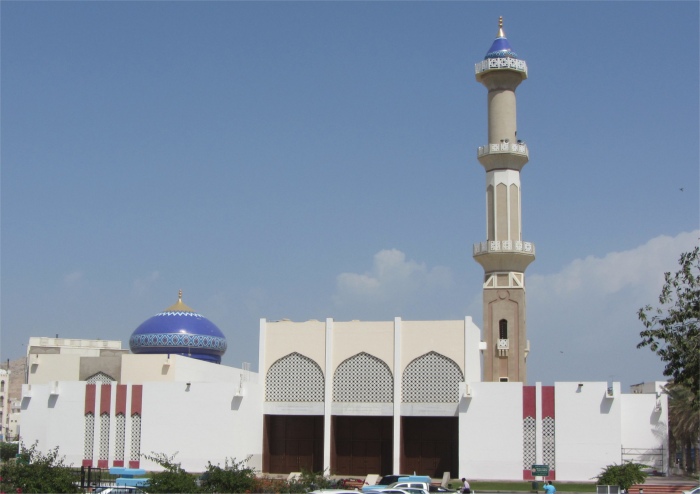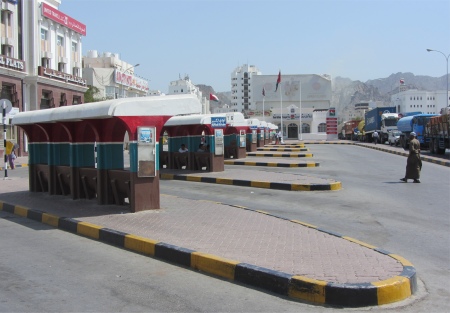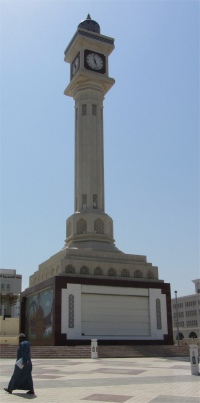
Clock Tower
|
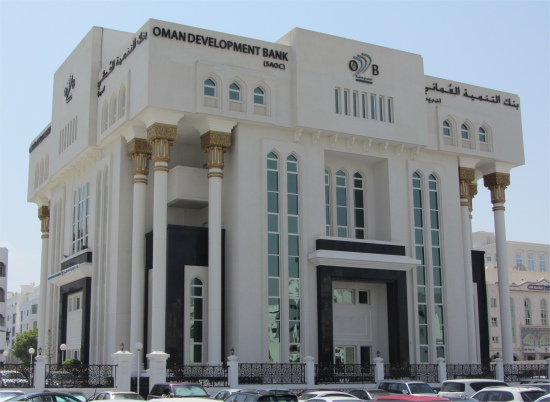
Oman Development Bank
|
The British slowly brought about a collapse of Muscat and Oman's "empire" by the end of the nineteenth century without use of force. Through gradual encroachment on its overseas holdings economically and politically, they caused Oman to retreat to its homeland. The sultans and imams of Oman clashed continuously through the first half of the 20th century. Oman, under Sultan Said bin Taimur, who came to power in 1932, experienced decades of international isolation, a society run along feudal lines and internal rebellion. In time Britain held such sway in Muscat and Oman itself that it became in effect, and later in fact, a British protectorate. Having control of the country's military, the British helped subdue rebel tribesmen in the 1950s, driving most into Yemen. The sultan ran a repressive regime, with laws forbidding numerous activities, including the building and even repair of his subjects' own homes without permission.
In a palace coup on July 23, 1970, the sultan, Said bin Taimur was overthrown by his son, Qaboos bin Said, who promised to establish a modern government and use newfound oil wealth to aid the people of this very isolated state. When he took over, Oman had two primary schools, no secondary schools, two hospitals run by the American mission and only 10km of sealed roads. The young sultan opened up the country, embarked on economic reforms and boosted spending on health, education and welfare. Oman effectively underwent a "Renaissance" under Sultan Qaboos, who has steered his domain into modernity and the 21st century.
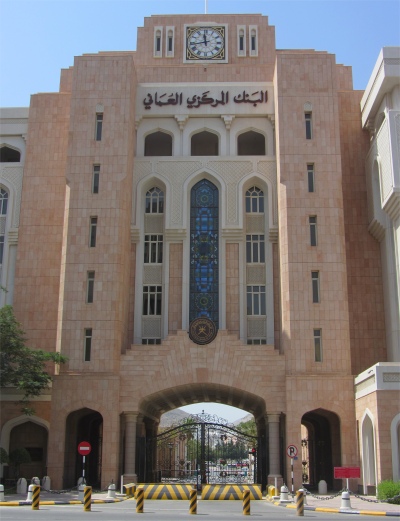
More Gleaming Architecture
|
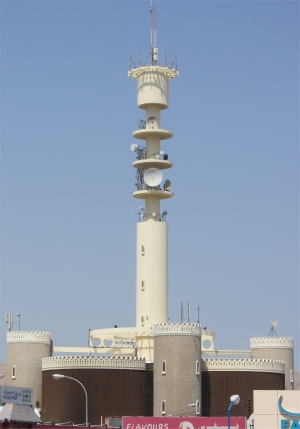
GPO Tower/Telephone Office
|
Oman joined the Arab League and the United Nations in 1971. A long border dispute with Yemen was resolved in Oct. 1992, and in 1997, the countries agreed to new maps defining the border.
Enough of the history. I made my mind up not to have an action packed day. Instead I went off to explore the area of Muscat where my hotel was based, known as Ruwi. Ruwi is the commercial hub and the main business district of Muscat, Sultanate of Oman. It's located around 5 km from the main residential localities of Al-Khuwair, Madinat Al Sultan Qaboos, Shati Al-Qurm and Al-Qurm. One of the oldest parts of Muscat, Ruwi was known for its narrow streets and old buildings some of which were demolished in the 1970s to build commercial structures in what is now the Central Business District (C.B.D.). This part of the sprawled out coast hugging city was also known as "Little India" because of the large Indian population, associated shops, restaurants and businesses based here.
The morning sun felt warm on my tanned skin, and I smiled as I recalled text messages I had recently received from Dan and my sister. Yesterday it snowed all day and the temperature was sitting at -4 degrees.
I must stress at this point that I was based in the C.B.D., and as such, like any other C.B.D., does not present a representative picture of a city or country. As I walked through Ruwi's broad and busy streets, I got the impression it was a city going places. Up until the 1970s, this would have been hills and rocks, now it was virtually brand new. Clean-lined buildings abounded in varied predominantly pastel colours. Creative, tasteful design had gone into the architectures.
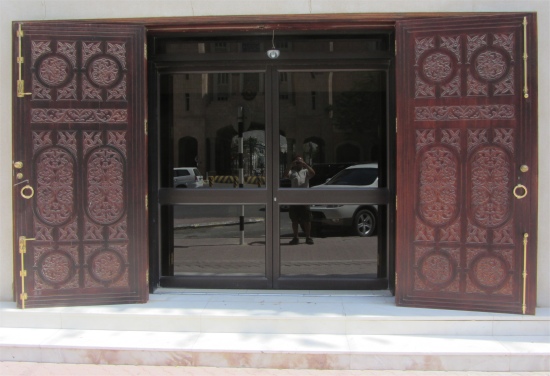
Office Doors
|
As in any C.B.D., the bulk of the buildings were financial institutions, and many other buildings contained small businesses at ground level, with residential floors above them. There were few very high-rise blocks, and even the most functional building was required to reflect tradition with a dome or an arabesque window. The result of these strict building policies was an attractive, spotlessly clean and whimsically uniform city – not much different in essence from the "very elegant town with very fine house"’ that the Portuguese admiral Alfonso de Alburqueque observed as he sailed towards Muscat in the 16th century. As I stated, this part of Ruwi was a clean area, with very little litter. I wasn't sure if people just didn't discard litter, or whether the city could afford an army of litter collectors. There was no evidence of the latter. It certainly appeared to be an affluent area. People owned spanking new cars, there were none of the Stone Town scooters, bikes and motorbikes here. The arterial roads were very busy with convoys having to pass through the district in order to reach Mutrah and surrounding areas.
Similar to Tanzania, motorists paid no heed to zebra crossings, but most people jay-walked anyway. The pavements were a contrast to Tanzanian, well-constructed and wide enough to drive a bus down, but to be fair Ruwi C.B.D. was a very modern development.
I could not get to grips with the people I came across in the streets, an eclectic mix of Arabs and Indians. Often, I could tell them apart, but there was definitely a grey area where I was stumped. The Tanzanian ready smiles were few on the ground here. At first I would greet passing strangers with "Marabah" (hello). Many would just ignore me, some would give an unintelligible retort. Occasionally I would get a warm smile. At times, a person would notice I was not from this neck of the woods (funny that), and with a big grin, would offer a hand with a, "How are you? Where are you from?" In contrast to conversations with Tanzanian locals, these conversations were short lived; these were busy guys. The use of the word "guys" is deliberate, I came across few women in the C.B.D.
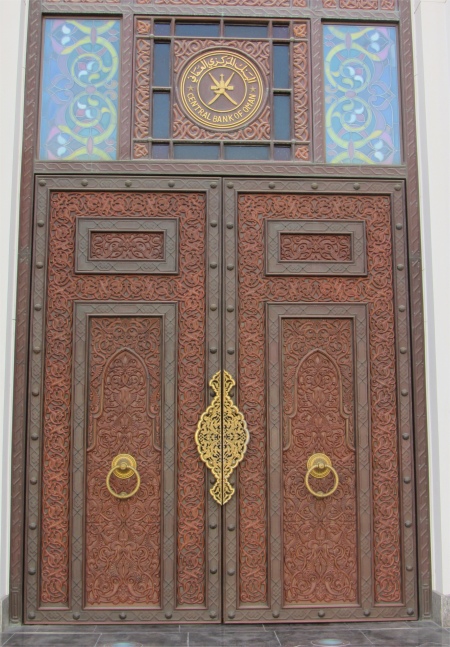
Central Bank of Oman Door
|
On my way back to base, I stopped off at one of the many small coffee shops, the coffee being delivered as hot, milky and sweet. Arabs have a fondness for sweet things, which may explain why there is a high incidence of diabetes in the country, yet they usually had perfect teeth. I sat at a small table outside in the shade. Locals sat at some of the other tables. I tuned in to the voices and noticed a mixture of Arabic and Indian, but what fascinated me was how they would occasionally lapse into English, not perfect English, but certainly detectable. I could not fathom that out.
I walked lazily back to my hotel through a hot, dry heat; the fiery Empty Quarter desert air wafting across the Hajar Mountains to the coast. For a temporary respite from the furnace, I took a dip in the pool, and as I floated on my back, I gazed up at a large hill that dominated the skyline next to the hotel. The temptation was soon lodged in my mind; if I could climb to the top of that hill I would get a cracking view for miles around.
Within half an hour, I was tramping the roads skirting the base of the hill, looking for access to a ridge that would provide a route to the summit. I found it, and started striding up an inclined road leading to the ridge. The buildings eventually stopped dead by the hills that towered over them. The road passed through a gate, and beyond it clearly wound its way to a series of radio masts on the peak. A sign clearly stated in Arabic and English that the land beyond the gate belonged to the Department of Information, and there was no unauthorised access. That was a pity, I was looking forward to a climb.
Undeterred, I climbed up to a ledge that skirted part way around a hill that stood outside the barred territory. The ledge was man-made, indeed all the landscape below me seemed to be man-made. In the centre of Ruwi, the rocks had been flattened and built upon. Here on the outskirts where I stood, the hills had been carved into in order to create land for new buildings. I looked down on roof tops immediately below me, the multi-storey buildings occupying the volume where rock had once stood. Tiers had been cut into the hillside to catch rock falls. From my perch above Ruwi, I could see and hear excavations taking place on almost all the mountains that ringed the district. Man was very much manipulating the landscape here, and it also explained why, when I took off from Muscat to Dar es Salaam 18 days ago I could see very little greenery. The ground was pure rock, with any soil for plants being deliberately brought in. Files of pylons, delivering the life blood to the city, marched purposely across the surrounding mountains.
